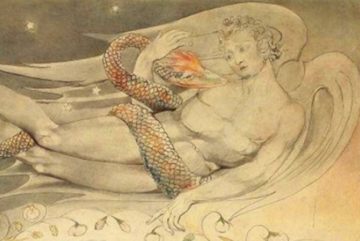David K. Anderson in The Hedgehog Review:
 Great critics enjoy magisterial prerogatives, and one of them is the right of comparing John Milton to William Shakespeare. When Samuel Taylor Coleridge took his turn, he was wise enough to refrain from making the two contenders for the title of England’s greatest poet. They are simply too different, he avers. Milton is Shakespeare’s “compeer, not his rival.” Shakespeare, Coleridge explains, “passes into all the forms of human character and passion,” while Milton, “attracts all forms and things to himself, into the unity of his own ideal. All things and modes of action shape themselves anew in the being of Milton; while Shakespeare becomes all things, yet forever remaining himself.” For Coleridge the authorial personality of the one is perfused throughout his work until no stable, freestanding sense of “Shakespeare” remains; the work of the other, line by exacting line, demands to be read in light of the man himself. Not even Dante, who cast himself as the protagonist of his own great poems, or Tolstoy, who pauses a narrative to interject whole philosophical essays, press themselves on the reader as forcefully as does Milton.
Great critics enjoy magisterial prerogatives, and one of them is the right of comparing John Milton to William Shakespeare. When Samuel Taylor Coleridge took his turn, he was wise enough to refrain from making the two contenders for the title of England’s greatest poet. They are simply too different, he avers. Milton is Shakespeare’s “compeer, not his rival.” Shakespeare, Coleridge explains, “passes into all the forms of human character and passion,” while Milton, “attracts all forms and things to himself, into the unity of his own ideal. All things and modes of action shape themselves anew in the being of Milton; while Shakespeare becomes all things, yet forever remaining himself.” For Coleridge the authorial personality of the one is perfused throughout his work until no stable, freestanding sense of “Shakespeare” remains; the work of the other, line by exacting line, demands to be read in light of the man himself. Not even Dante, who cast himself as the protagonist of his own great poems, or Tolstoy, who pauses a narrative to interject whole philosophical essays, press themselves on the reader as forcefully as does Milton.
More here.
